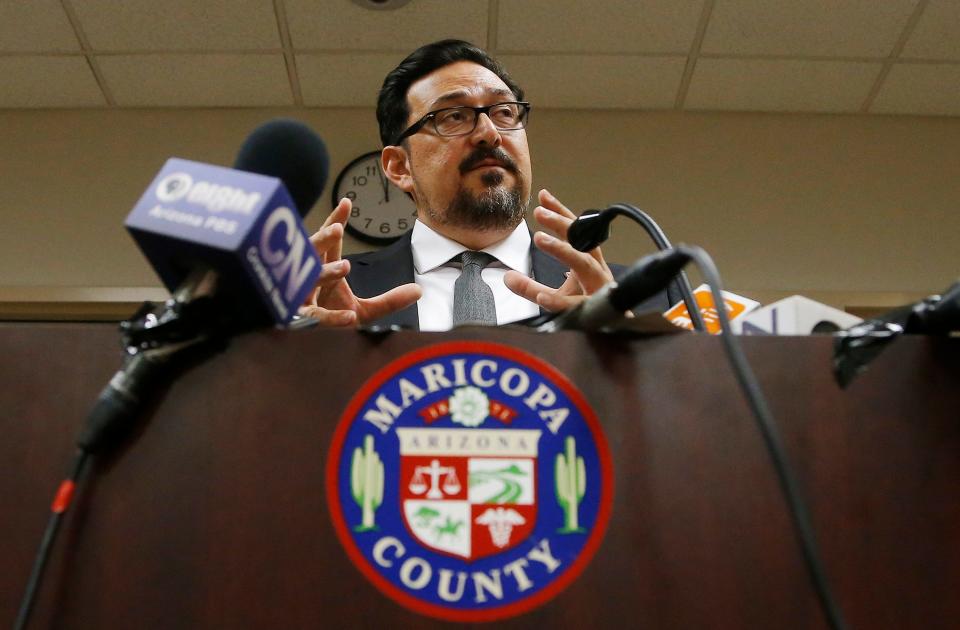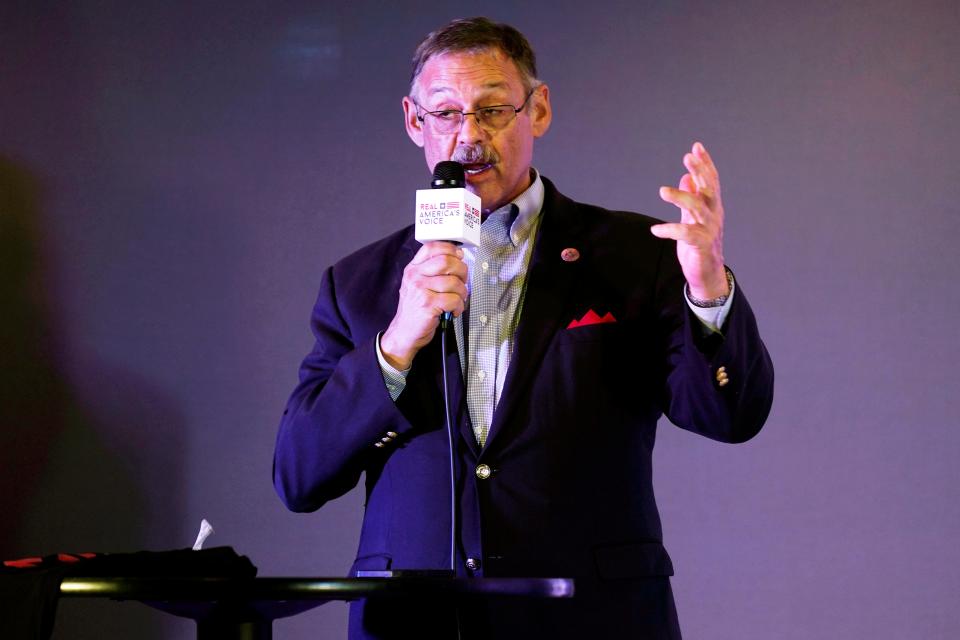Takeaways: In debate, Arizona secretary of state race all about 2020 election denials
Arizona's Republican secretary of state candidate, Mark Finchem, revealed Thursday that he's been interviewed by the House Jan. 6 committee, just one instance where a 2022 midterms debate repeatedly harkened back to the 2020 presidential race and denial around those election results.
The 30-minute discussion, which also included Democrat Adrian Fontes, was the first of the fall campaign debates featuring a GOP nominee who has denied the outcome of the 2020 contest.
But with such candidates running for office from the local to the federal level across the country this year, the Thursday event in Arizona won't be the last of its kind.
Finchem, a state legislator, is one of the most prominent election deniers on the ballot this fall and has regularly promoted former President Donald Trump's false claims about losing reelection.
Politics: Facing DOJ lawsuit, Arizona could be model for states to require proof of citizenship to vote
More: Reps. Liz Cheney, Zoe Lofgren propose reforms to the Electoral Count Act
Fontes has leaned into making the race about Finchem's past comments and actions, including attending the "Stop the Steal" rally ahead of the Capitol riot on Jan. 6, 2021.
The conversation focused largely on Finchem, but also touched on the Jan. 6 attack, national voting rights legislation and faith in U.S. elections.
Here are the big takeaways from Thursday's debate.

'Laws and lies'
Arizona, which carries 11 electoral votes, is one of a handful of critical swing states that could determine the outcome of the next presidential election.
Fontes, a Marine veteran, said the election is about picking between "laws and lies," adding that "democracy is a decision between voting and violence."
Moderators asked Finchem if he would have signed off on President Joe Biden winning Arizona if he were secretary of state.
Midterms: Investigations may help Donald Trump politically — and that may hurt the Republican Party
The former Kalamazoo, Michigan police officer said there were "too many hypotheticals" to answer before saying that some votes were "outside of the law."
Arizona endured a 10-month saga of hand recounts fueled by skeptics that cost taxpayers millions, which ultimately found Trump received fewer votes than were originally counted.
Fontes said his opponent's comments were "dangerous for America" and were "an entire set of fiction."
"When we have conspiracy theories and lies like the ones Mr. Finchem has just shared, based in no real evidence, what we end up doing is eroding the faith that we have in each other as citizens."
Jan. 6 Capitol riot
The moderators asked Finchem what he expected to happen on the day rioters eventually stormed the Capitol building and if voters would think it was appropriate he was there.
Jan. 6: Hero officer recounts harrowing moments of Capitol riot in attacker trial
Finchem said he was interviewed by the Department of Justice and the Jan. 6 congressional committee but has never been charged.

What about the midterm primaries?
Finchem has maintained that the 2020 contest was "stolen" from Trump.
Asked if the 2022 midterm primaries in August were fair or, as he's alleged of 2020, plagued by fraud, Finchem at first said he had, "no idea."
But when questioned what changed in the course of two years the GOP contender admitted the voting machines were the same.
"What changed? The candidates," Finchem said.
Politics: House Jan. 6 committee comes to agreement to interview Ginni Thomas, wife of Justice Clarence Thomas
More: House approves overhaul of vote counting law at heart of Trump attempt to overthrow 2020 election
Finchem: Feds should 'butt out'
Finchem also set himself against federal efforts to reform elections.
"I think the federal government needs to butt out of states' rights," he said. "It is the legislature who names the time, place and manner of an election, not the federal government."
Fontes said the U.S. Constitution makes clear that Congress "plays a significant role" in crafting election rules.
Midterms: TV ads, takeout food, 'campaign attire.' Here's how 2022 midterm candidates are spending their money
Mail-in voting?
Arizona was ahead of most states when it allowed for mail-in voting in 1991.
Since Trump's defeat Republicans nationally and in Arizona have been more critical of the idea.
But Fontes defended the practice, saying the secretary of state's role is partially to ensure every Arizona voter can choose how they want to vote.
"Mr. Finchem wants to strip Arizona citizens of their capacity to vote by mail," he said.
Finchem was asked if he wanted to eliminate mail-in voting.
"What I want doesn't matter," he said.
Finchem asserted that his views are irrelevant because the legislature rather than the secretary of state writes state law, but that he doesn't favor doing so personally.
"I don't care for mail-in voting," he said. "That's why I go to the polls."
This article originally appeared on USA TODAY: Takeaways from the Arizona secretary of state debate


